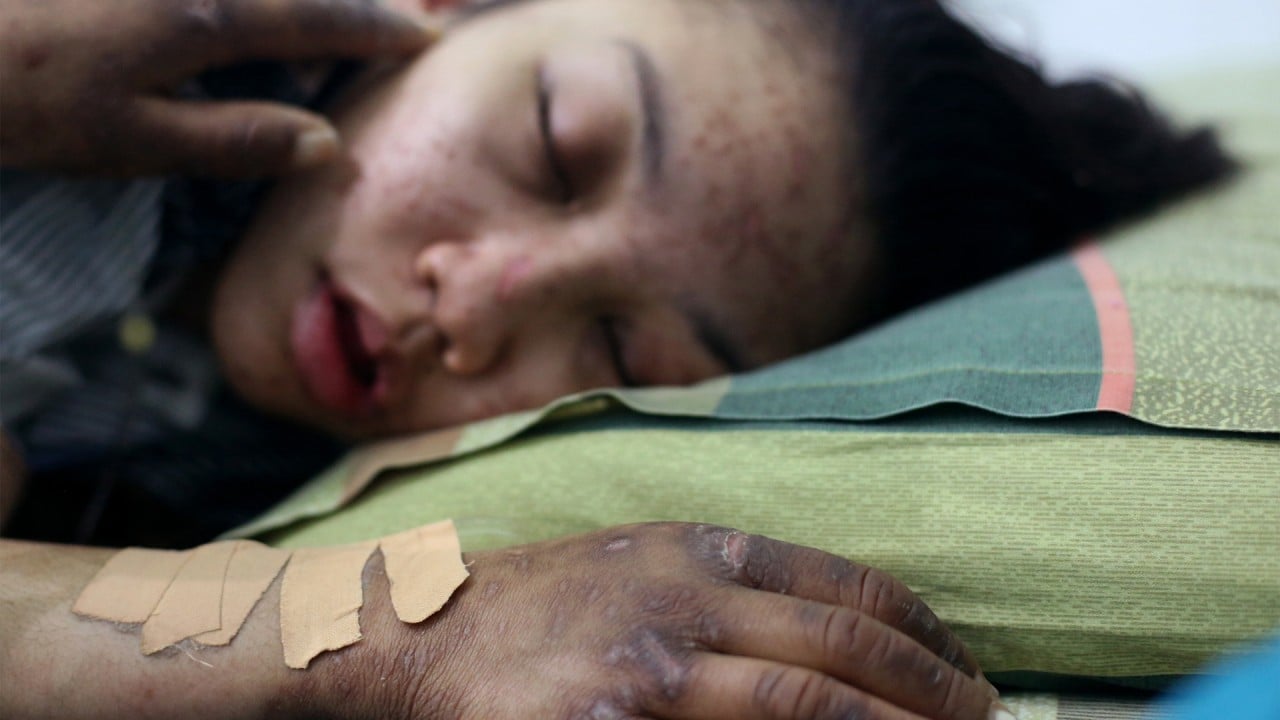
‘Desperate’ Indonesians risk abuse, death in Malaysia by taking jobs from illegal recruiters
- Indonesia’s migrant protection agency said nearly 2,000 Indonesian migrant workers had died as a result of abuse, accidents, or illness since 2020
- Without proper documentation, access to healthcare or protections from government-licensed agents, Indonesian workers are often vulnerable to exploitation
“People are desperate and can fall into the trap of using these illegal pathways,” she said, noting that many either travel using falsified documents or are taken on overcrowded motorboats, often from Batam, an Indonesian island neighbouring Malaysia.

The deaths of these workers can be caused by extreme work conditions, health issues, starvation and in some cases, suicide, Sister Laurentina said, adding that “so many families” had been touched by tragedy.
“I have compassion for them, and try to make sure that these workers are treated with dignity, even after their death,” she said.
In May, Indonesia’s migrant protection agency (BP2MI) said nearly 2,000 Indonesian migrant workers had died overseas, including in Malaysia, as a result of abuse, accidents, or illness since 2020.
That equates to around two deaths a day.
The migrant workers of East Nusa Tenggara facing ‘modern-day slavery’
The number is believed to have surged after pandemic-era curbs wiped out savings, forcing more people into taking work abroad, often illegally.
Indonesian workers primarily go to Malaysia and the Middle East for jobs as domestic workers, or in construction or agriculture. They can earn four to six times as much money abroad as at home, government research shows, and last year they sent home almost US$10 billion in remittances.
But the costs are mounting.
More than 10 coffins carrying the bodies of illegal migrant workers from East Nusa Tenggara are returned to the province every month, according to local news outlet Kompas. In June, one of them belonged to 20-year-old Agnes Peni Muda, who was allegedly trafficked into Malaysia after accepting a job on the black market.

‘Inhumane treatment’
Many incidents of labour abuses have been recorded in Malaysia, and unlicensed recruitment agencies are rampant, according to migrant rights groups.
In July last year, Indonesia halted deploying workers to its neighbour, citing a breach of an agreement that saw Malaysia’s immigration authorities use an online recruitment system for domestic workers linked to allegations of trafficking and forced labour. The freeze was lifted a month later.
In Indonesia, a lot of people go through unlicensed agencies
Activists say without proper documentation, access to healthcare or protections from government-licensed agents, Indonesian workers are often vulnerable to exploitation.
“It’s something that is very deeply rooted in the migration culture between the two countries,” said Fajar Santoadi from Malaysia-based migrant rights group Tenaganita.
“In Indonesia, a lot of people go through unlicensed agencies,” Fajar said, explaining that the costs of official routes were a “high barrier of entry for those who are desperate”.
Indonesian migrant worker Ilham took the unregulated path to Malaysia, arriving in 2018 for a job at a cleaning company in Selangor.
But things swiftly started to unravel, he said. At first, the employer began paying him half and then a quarter of his contracted 1,400 ringgit (US$300) monthly salary.
“My documents and passport were taken,” he told This Week in Asia, requesting to go only by his first name. “I lost so much weight because I didn’t have money for food. Because of my weakness, I would get sick very often. Each time I was scared I might not make it.”
Indonesia’s freeze on migrant workers risks derailing Malaysia’s economy
As an undocumented migrant, his employer exploited his vulnerability to keep him working, until another Indonesian migrant worker eventually helped him escape.
“I am just happy to still be alive,” he said, now back home in West Sumatra.
“Instead of immediate deportation to Indonesia, migrant workers who did not have the right documents experienced prolonged detention in these centres in Sabah, where they faced inhumane treatment,” the KBMB said in an email to This Week in Asia.
Malaysia’s immigration department did not immediately respond to a request for comment.

Women at risk
Afliana Hitu, 35, from Indonesia’s East Nusa Tenggara province used a fake name – Fransina – to secure a passport and travel to Malaysia with the help of an unlicensed agent in 2016.
She arrived in Malaysia via Johor, and stayed in temporary housing arranged by her recruiter for a few days while potential employers interviewed her to become a domestic helper.
She was eventually hired and worked for her employer for four-and-a-half years. Like Ilham, her employer stopped paying her promised salary – but fear of deportation prevented her seeking help.
Indonesian migrant workers in Taiwan face struggles, discrimination
“They were never going to pay me my salary for the work I was doing. I finally had enough and had to run away from there,” she said.
Tenaganita, the migrant rights group, took her into their shelter and helped facilitate her return to Indonesia in 2021. Two years later, she is still waiting on courts in Malaysia to process her unpaid wages case.
Many are also victims of human trafficking – duped by brokers with promises of lucrative pay and arriving in Malaysia without a valid work permit only to later suffer abuses without access to legal protections.
Hong Kong cases
But working abroad through legal means is not always safe.
Her employers were convicted and jailed in 2013 after a court found they had subjected her to severe abuse, including burning her with an iron, beating her with a bike chain and assaulting her with a paper cutter.
Beaten, raped, forced to drink dog urine: abused Indonesian helper fights on
Activists have documented growing cases of abuse in the financial hub, which hosts an estimated 340,000 migrant domestic workers, mainly women from Indonesia and the Philippines.
They are paid below the minimum wage, and face routine challenges securing visas, which expire when their work contracts end.
“We continue to hear cases of physical violence, rape and sexual abuse, as well as extreme working hours for low wages,” said Eni Lestari, chairwoman of the International Migrants Alliance, and also an Indonesian domestic worker in Hong Kong.
“There is also the mental and psychological strain put on these workers because the rule is that they must live with their employers, and often they don’t know where to get support if they are in trouble.”


